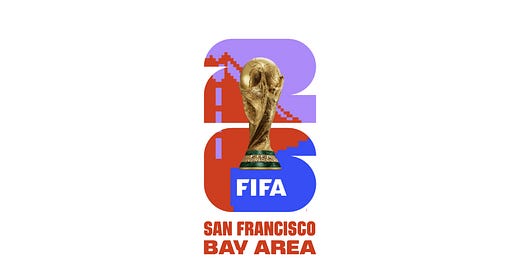Who Pays When FIFA Comes to Town? The 49ers Are About to Find Out
With the state pulling back, Santa Clara law limiting public spend, and FIFA taking the spoils, Levi’s Stadium faces a $37 million question
When the 49ers secured six matches for the 2026 FIFA World Cup at Levi’s Stadium, it was billed as a triumph for Bay Area sport. But now, with just a year to go, the financial victory lap has turned into a slow-motion sprint toward a steep fiscal cliff.
Hosting costs are projected at $50 million. FIFA is putting up just $13 million. And the state of California? Governor Gavin Newsom’s revised budget has pulled out entirely, citing fiscal pressure from national budget instability and a $12 billion local deficit.
That leaves one of the NFL’s most valuable franchises staring down a potential $37 million bill. Not to renovate infrastructure or build new facilities. Just to host the games.
The Santa Clara City Council has technically approved the use of FIFA’s contribution to cover city expenses. The 49ers have said they will cover any additional “approved public safety costs,” but the language is vague and the shortfall is substantial.
The team, through the Bay Area Host Committee (BAHC), is now searching for private sponsors and exploring legislative workarounds to bridge the gap. It’s a strategy that speaks volumes about FIFA’s model rather than any lack of civic enthusiasm.
Hosting a FIFA World Cup is often pitched as a rare economic opportunity. The BAHC has projected over $500 million in regional benefits through tourism, media attention and related spending. But these projections rarely survive scrutiny.
Cities that hosted past tournaments, from Johannesburg in 2010 to São Paulo in 2014, have seen inflated forecasts dissolve in the face of public cost overruns and uneven benefit distribution. In Santa Clara’s case, there is the added constraint of a local ordinance that prohibits the use of taxpayer dollars for stadium events. Ironically, that rule may now shield the city more than it limits it.
Follow me for more sports and life updates: Instagram
FIFA, meanwhile, keeps control of every key revenue stream. Sponsorship, naming rights, ticketing and even in-stadium advertising are handled exclusively by the organisation. This leaves local hosts responsible for costs like policing, crowd management, transport, and infrastructure.
Keep reading with a 7-day free trial
Subscribe to Culture of Sport to keep reading this post and get 7 days of free access to the full post archives.




